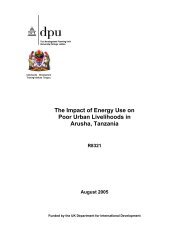EPA Review Annex Documents - DFID
EPA Review Annex Documents - DFID
EPA Review Annex Documents - DFID
Create successful ePaper yourself
Turn your PDF publications into a flip-book with our unique Google optimized e-Paper software.
In the case of Ghana, where there is a single chapter for SPS and TBT measures, the<br />
parties also reaffirm their commitment to abide by their rights and obligations under the TBT<br />
Agreement.<br />
It is evident, however, that many of the ACP states had rather grander expectations of the<br />
<strong>EPA</strong> negotiations. Thus, while there was agreement that the <strong>EPA</strong>s should address SPS<br />
issues, the starting position of the ACP states included the following provisions (ACP<br />
Secretariat, 2003; Chemnitz and Gunther, 2006):<br />
• A standstill on EU SPS measures as from September 2003, predominantly to enable<br />
the ACP countries to ‘catch up’ with existing regulatory requirements.<br />
• Derogations of five to ten years for ACP countries to provide an extended period for<br />
compliance with EU SPS regulations.<br />
• Conclusion of equivalence agreements with ACP states to facilitate trade in<br />
agricultural and food products.<br />
• Negotiation of additional funds for development cooperation in the area of SPS<br />
measures, which exceed existing commitments under the European Development<br />
Fund (EDF).<br />
The first of these points is clearly in violation of the rights of the EU under the SPS<br />
Agreement, and was always going to be a ‘non-starter’. While the SPS Agreement allows<br />
for special and differential treatment in the case of developing countries, including additional<br />
time for compliance, it is hard to imagine that the European Commission would ever<br />
entertain derogations in compliance for the ACP countries of up to a decade.<br />
The initial negotiations did start with some areas of agreement, notably that the <strong>EPA</strong>s should<br />
provide a mechanism for coordination and consultation on SPS measures and that the EU<br />
should assist the ACP countries in enhancing their SPS capacity (Chemnitz and Gunther,<br />
2006). Further, the ACP states evidently became more realistic in their expectations with<br />
respect to what the negotiations could achieve, both in terms of what the EU would be willing<br />
to concede and also what they could offer in terms of their own capacity, and also<br />
recognised more fully their role in engendering regional integration rather than simply EU-<br />
ACP trade. For example, while the EU was open to the concept of establishing equivalency<br />
agreements, given that most of the ACP states lacked systems of conformity assessment<br />
that were internationally-accredited, the first stage was inevitably capacity-building. As<br />
highlighted above, the EU was willing to provide assistance to facilitate processes of<br />
capacity-building, although not to commit specific levels of funding, seeing this as a separate<br />
and wider issue within the framework of the EDF.<br />
Scope of the agreements<br />
Of the final or interim agreements agreed to date, they all include provisions for SPS<br />
measures with the exception of the EAC and EAS interim agreements. Both of these<br />
agreements include SPS measures in their rendez-vous clauses. While the final agreement<br />
between the EC and CARIFORUM and the interim agreement between the EC and SADC<br />
have a chapter devoted to SPS measures, all of the other interim agreements have a<br />
common chapter devoted to SPS and TBT measures. In these latter cases it is evident from<br />
the language, however, that SPS measures are at the forefront of the agenda and indeed a<br />
number of the provisions make specific reference to SPS measures.<br />
All of the agreements, in defining SPS measures and outlining the scope of the provisions of<br />
the <strong>EPA</strong> reference the SPS Agreement and the definitions outlined by relevant international<br />
234
















